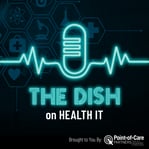Listen and Subscribe to Our Podcast
"The Dish on Health IT"
Engaging discussion around Health IT with perspectives from across the healthcare landscape. This informative and entertaining rotating panel of senior health IT consultants and their guests will keep you in the know about the latest innovations, policies and industry shifts impacting healthcare and point out the opportunities that lie within.

Subscribe on:
Apple Podcasts
Google Podcasts
Episode 6: Payers Evolve Approach to Medication Management
Pooja Babbrah from Point of Care Partners joins hosts, Gary Austin and Ken Kleinberg to talk about changes in the way payers are dealing with pharmaceutical management.
Ken Kleinberg opens the discussion by emphasizing the impact of medications on the health of our nation and healthcare costs. Ken notes that payers are now more focused on medications than ever, particularly due to the rise of specialty medications and cost increases.
To combat the challenge of prescription costs and healthcare coverage, Ken calls for an industry-wide team effort. For example, physicians need to be more aware of prescription costs, understand how much coverage patients have as well as what they can afford. Patients need to have access to better information in order to participate in their treatment decisions and adherence. Additionally, payers need to focus more on value.
Gary moves the conversation to talk about key transformational topics in pharmacy, including consumer access to pharmaceutical data. Pooja mentions the recent approval to publish a joint HL7 and NCPDP implementation guide, which allows consumers to research the lowest price for their medications with a mobile application. The goal of the guide is to allow patients to identify the cheapest drugs and to compare insurance coverage against discount programs.
When developing the guide, Pooja notes that there was an existing transaction within the marketplace that Health IT vendors, PBMs and payers had already employed. The new guide was made as a joint effort between the two standard development organizations to make sure it would be easier to implement from a PBM and payer standpoint as well as a Health IT vendor standpoint.
Gary then asks Ken how payers might benefit from these changes. Ken explains that payers recognize if patients do not take their prescribed drugs, their health may deteriorate and lead to greater downstream costs. If the reason patients are not filling prescriptions or adhering to treatments are cost-based, payers need to know this. Payers also have the motivation to ensure patients are only prescribed what they need.
Gary goes on to ask Pooja about price transparency around pharmaceuticals and what it means to the average consumer. She states it is all about consumers having a place to go to figure out what is the cheapest way to get a medication, where to get it and how to get it.
Other content you may be interested in:
CARIN Alliance Workgroup to Help Advance Real-Time Pharmacy Benefit Check for Patients
Urgent Need for Real-Time Pharmacy Benefit Check Confirmed in Senate Committee Hearings




